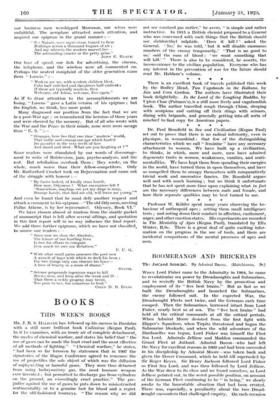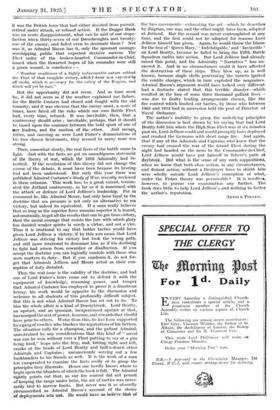BOOMERANGS AND BRICKBATS
Th Jutland Scandal. By Admiral Bacon. .(Hutchinson. 5s.) WHEN Lord Fisher came to the Admiralty in 1904, he came to revolutionize sea power by Dreadnoughts and Submarines, and to revivify the British Navy by the promotion and employment of its " five best brains." But as fast as we built the Dreadnoughts and launched the Submarines, the enemy followed suit. In the expected War, the Dreadnought Fleets met twice, and the Germans each time escaped. Then the Submarines, borrowed intact from Lord Fisher, nearly beat us at sea. The " five best brains " had held all the critical commands at all the critical periods. When Admiral Moore desisted from the first fight with Hipper's Squadron, when Tirpitz threatened and began the Submarine blockade, and when the wild adventure of the Dardanelles was begun, Lord Fisher was himself the First Sea Lord. Admirals Jellicoe and Madden- commanded the Grand Fleet at Jutland. Admiral Bacon—who had left the Navy for excellent reasons in 1909 and had been succeeded in his discipleship by Admiral Moore—was taken back and given the Dover Command, which he held till superseded by Sir Roger Keyes. Sir Henry Jackson followed Lord Fisher as First Sea Lord, and was then followed by Lord Jellicoe. As the War drew to its close and we found ourselves, as Lord Jellicoc pointed out, in the worst possible position, on account of the German Fleet continuing to be " in being," we slowly awoke to the lamentable situation that had been created. There was, especially, a peculiarity about the two Dread- nought encounters that challenged enquiry. On each occasion it was the British force-that had either desisted from pursuit, Tetired under attack, or refused action. If the Dogger Bank was an acute disappointment, what can be said of our stupe- .faction when thirty-seven of our Dreadnoughts met twenty- one of the enemy, and failed even to decimate them ? Nor was it, as Admiral Bacon has it, only the ignorant courage- worshipping public that expected decisive success. The Fleet order of the broken-hearted Commander-in-Chief, .issued when the thwarted hopes of his comrades were still a green wound, is conclusive :— " Weather conditions of a highly unfavourable nature robbed the Fleet of that complete victory, which I know W1,8 expccted by all ranks, which is ne:iessary for the safety of the Empire, and which will yet be ours."
But the opportunity did not recur. And as time went by, it did not seem as if the weather explained our failure, for the Battle Cruisers had closed and fought with the old tenacity, and it was obvious that the enemy must, a score of times, have faced all the risks which our own Battle Fleet had, every time, refused. It was inevitable, then, that a controversy should arise ; inevitable, perhaps, that it should be based upon the contrast between the bold spirit of one of our leaders, and the caution of the other. And savage, bitter, and sneering as were Lord Fisher's denunciations of his two chosen lieutenants, they seemed to many none too strong.
Then, somewhat slowly, the real facts of the battle came to light. And with the facts we got an unambiguous statement of the theory of war, which the 1916 Admiralty had in- herited. If the revelation of this theory did not change the course of the debate, it must have been because its bearing had not been understood. But early this year there was published Admiral Custance's Study of War, recently reviewed in these columns. This work has, to a great extent, termin- ated the Jutland controversy, so far as it is concerned with the attack or defence of Lord Jellicoe's leadership. For in command he, like Admiral Moore, had only been loyal to the doctrine that sea pressure is not only an alternative to sea victory, but indeed its equivalent. If a. man really believes that so long as the superior force remains superior it is bound, automatically, to get all the results that can be got from victory, then the moral courage that resists the lure with which glory has dazzled weaker spirits is surely a virtue, and not a vice. Thus it is irrational to say that bolder tactics would have given Lord Jellicoe a victory, if by this you mean that Lord Jellicoe was striving for victory but took the wrong path, and still more irrational to denounce him as if his declining to fight had arisen from cowardice or disaffection. If you accept the doctrine you can logically condole with those who were martyrs to duty. But if you condemn it, do not for- get 'that Admirals Jellicoe and Moore acted as their con- ception of duty dictated.
Thus the real issue is the validity of the doctrine, and had one of Lord Fisher's heirs come out to defend it with the ' equipment of knowledge, reasoning power, and temper that Admiral Custance has employed to prove it a disastrous heresy, his work would be apposite to the discussion and welcome to all students of this profoundly difficult subject. But this is not what Admiral Bacon has set out to do. To him the whole affair is a kind of Donnybrook. Lord Beatty, an upstart, and an ignorant, inexperienced upstart at that, has usurped the seat of power, honours, and rewards that should have gone to others. Worse than this, he has been supported by a gang, of rowdies who blacken the reputations of his betters. The situation calls for a champion, and the gallant Admiral, unrestrained by any considerations that this kind of " naval war can be won without ever a Fleet putting to sea or a gun being fired," leaps into the fray, and, hitting right and left, cracks at the heads of Lord Beatty and half-a-dozen other Admirals and Captains ; unconsciously serving out a few backhanders to his friends as well. It is the work of a man too exasperated to examine the facts coolly or to grasp the principles they illustrate. Hence one hardly knows where to begin upon the blunders of which the book is full. The Admiral rightly points out that, as our fire control did not permit of keeping the range under helm, the art of tactics was neces- sarily tied to narrow limits. But never was it so absurdly circumscribed as Admiral Bacon's account of the choice :of deployments sets out. He would have us believe that of
the two movements—exhausting the art—which he describes by diagram, one was, and the other might have been, adopted at Jutland. But the second was .never contemplated at any time, and the first could not be adopted for reasons Lord Jellicoe himself has given. Again, he would throw the blame for the loss of Queen Mary," Indefatigable,' and ` Invincible ' on Lord Beatty, because he failed to bring the Fifth Battle Squadron earlier into action. But Lord Jellicoe had already raised this point, and the Admiralty " Narrative " has an- swered it. And in no circumstances could it have affected the destruction of these ships. They blew up, as is well known, because single shells penetrating the turrets ignited the cordite charges, which in turn exploded the magazines. Admiral Bacon's argument would have looked very different had a footnote stated that this terrible disaster—which resulted hr the loss of some three thousand gallant lives-- was due to faulty loading arrangements chosen, like the fire control which limited our tactics, by those who between 1905 and 1912 had in succession held the post of Director of Naval Ordnance.
The author's inability to grasp the underlying principles of the discussion is best shown by his saying that had Lord Beatty told him where the High Seas Fleet was at six minutes past six, Lord Jellicoe could and would promptly have deployed and crushed the Germans with short range fire. And again, that if any of the Admirals and Captains who knew that the enemy had crossed the rear of the Grand Fleet during the -night had handed on the news to the Commander-in-Chief, Lord Jellicoe would have put himself in Scheer's path at daybreak. But what is the sense of any such suppositions,
when we know that both close action, in any circumstances, and distant action, without a Destroyer force to shield him were wholly outside Lord Jellicoe's conception of what, under the Fisher theory was permissible ? It is needless, however, to pursue our examination any further. The book does little to help Lord Jellicoe's and nothing to better the author's reputation.
ARTHUR POLLEN.















































 Previous page
Previous page